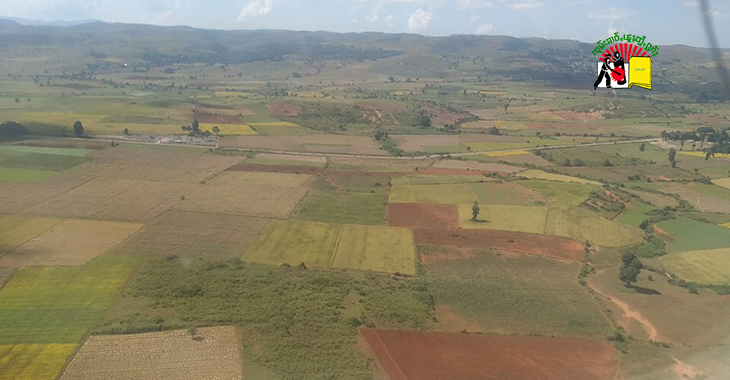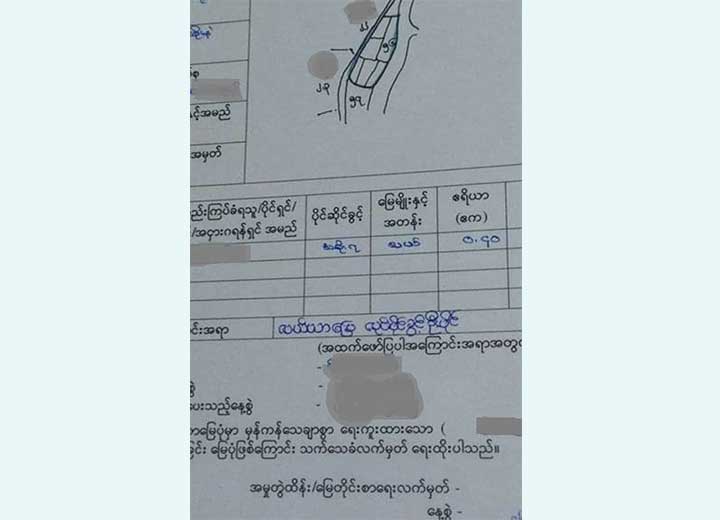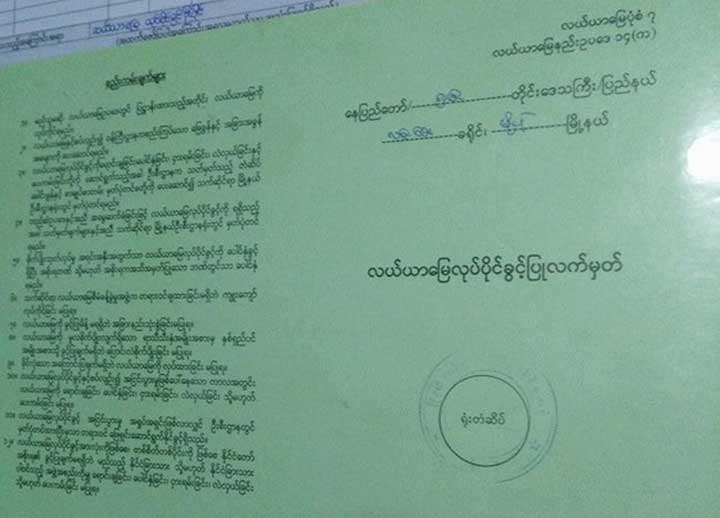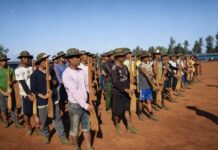The implementation of the Vacant, Fallow and Virgin Lands (VFV) Management Law of 2012 as Amended by The Law Amending the Vacant, Fallow and Virgin Lands Management Law of 2018 that comes into effect on September 11, is supposed to harmonize the various land laws, according to the National Land Use Policy (NLUP). But it has just done the opposite and in process of implementation it seems to be gearing to harm the marginalized ethnic farmers than actually protecting them.
Accordingly, detailed information on the extent and use of land together with the Form 7 (rights to work the land permit) have to be submitted. And if the applications are rejected, they will be served summary eviction notices without having the right to appeal. Further, if convicted a maximum penalty of two years imprisonment and a fine of 500,00 Kyats can be fined.
Reportedly, there are more than 40 laws (according to United Nationalities Alliance (UNA) statement 60) on the books, some of which date back to colonial era that are administered by a range of government departments and bodies, according to a recent report in Frontier Myanmar. The NLUP of 2016 is to be applied when drawing up a national land law to harmonize the often conflicting positions of the law books given. But it is still in an early stage as the National Land Use Council (NLUC) tasked to do the job is headed by Vice-President Henry Van Thio. In other words, the harmonized national land law is still a long way off and at present it is still under discussion, which have already taken place several times, involving ministers who are on the National Land Use Council, the Nay Pyi Taw Council chair, chief ministers of the states and regions, lawmakers, heads of departments, ethnic representatives, international organizations and civil society groups.
Against this backdrop, the latest amendment of the VFV Lands Management Law of 2018 that comes into effect is like dropping a bombshell among the ethnic states farmers, towns and villages communities which have always practiced their traditional customary land law for hundreds of years.
This amendment which is endorsed by the National League for Democracy (NLD) MPs irked many from Non-governmental Organizations (NGOs), International Non-governmental Organizations (INGOs), Civil Society Organizations (CSOs) and most importantly, the Ethnic Armed Organizations (EAOs) and Ethnic Political Parties (EPPs), as the NLD government came into the office with the election manifesto to resolve the land tenure conflict and land confiscation mainly between the Military or Tatmadaw, government institutions and private enterprises and the people around the country, especially in the ethnic states where armed conflicts have been going on unabated for decades.
At first resolving the land confiscation seems to be the NLD main policy but as time goes by the cases against the government institutions piled up more than it is able to resolve and as a result the NLD government is said to be overwhelmed and bogged down, unable to implement a holistic solution for the foreseeable future.
Some pundits have speculate this might be one reason to get hold of the problem once and for all, to legalize the Tatmadaw and government institutions’ land confiscation, which are the main perpetrators and at the same time also works to erode the call for rights of self-determination in a broader sense by the ethnic nationalities, where customary land tenure rights remain the cornerstone of the the EAOs. No wonder that the EAOs and the ethnic nationalities are so concerned, angered and disappointed. It should also be noted that the EAOs have their administrative machinery in place, parallel to the government, regarding land title certificates based on customary laws.
Another argument for such a hasty promulgation of VFV amendment is that the NLD government would like to make use of the some 50 million acres considered as VFV land mass to generate food and revenue sources, at a time when foreign investment is declining and domestic economy slowing down, writes Frontier Myanmar.

The Karen protest
On December 2, Karen National Union (KNU) of Taungoo District, in Htan Tabin Township, held its sixth district meeting and released a four-point statement.
In addition to its protest of government’s expansion of reserved forest lands in its controlled areas, Tatmadaw’s road-building in its areas, which the KNU said was for its logistics support for Tatmadaw’s troops movement rather than the development of the area, the statement also spelled out its dislike and rejection of the government’s newly promulgated VFV law of September 2018.
“We want the government to know that we have laws regarding forest and administrative machinery. We also have land use policy. We don’t have VFV land and we have already allotted the appropriate land use (to the Karen people). This amendment also threaten other ethnic nationalities and that is why we are demanding to abandon it,” said KNU Taungoo District spokesman Saw Thu Kabee to the BBC.
A clear indication of hybrid administration system, one by the government and the other the EAOs, which could only be resolved only through political means and peace process.

NGOS, INGOs and CSOs
VFV Lands Management Central Committee, the permit-granting body chaired by the Ministry of Agriculture, Livestock and Irrigation, issued a notice on October 30 that a six-month deadline on March 11, 2019 will be enacted for permit applications, and reiteration of the penalties for trespassing.
This pushed the NGOs and INGOs alike, such as Lands in Our Hands, a network of smallholder farmers’ group and 41 Myanmar NGOs and INGOs to issue statement and open letter the abolition of the VFV amendment dated September 11, 2018. Reportedly the open letter emphasized the point to “prevent the imprisonment and eviction of innocent individuals and communities”, and to enforce a moratorium on all new land concessions to private entities under the law.
The letter also pointed out that the amendment law will undermine the peace process because ethnic leaders prioritize recognition of customary land, as persons displaced by conflict lived in areas which may now be considered VFV land.
UNA
The EPPs also chipped in their lots when the UNA issued a seven-point statement on November 19 and called for the abolition of the VFV amendment.
It argued the inconsistency of the amendments as: “The Farmland Law and the Vacant, Fallow & Virgin Land Management Law come up with out a land policy as the National Land Use Policy was adopted in January 2016. And in the presence of more than 60 laws related to land use, the National Land Use Policy stipulates the National Land Use Council to draft a National Land Law.”
It further pointed out the fact that: “In section 66(b) of the National Land Use Policy Part-8 – Land Use Rights of the Ethnic Nationalities – it demands to recognize formally & to protect customary land tenure rights and related local customary land management practices of ethnic groups, whether or not existing land use is registered, recorded or mapped. The Vacant, Fallow & Virgin Land Management Law 2018 is in contrary with that provision.”
The center of its argument is the ownership of people: “People across country, depending and conserving land, forest, environment and ecosystems through generations, are the primary owners. The principal interpretation of vacant, fallow & virgin land on the land resources those already have owners – means grabbing the land ownership of people.”
UNA is an alliance of ethnic political force and is comprised of 16 EPPs. The statement is joined by Arakan League for Democracy and Democratic Party for a New Society.

Perspective
As various scenarios unfold, it is quite evident that the VFV amendment is pouring more oil into the burning fire as it is programmed that the political and as well the military confrontation between the Nationwide Ceasefire Agreement (NCA)-signatory EAOs like KNU and Restoration Council of Shan State (RCSS), that are now out of tune with the stalled peace process, will escalate. It is now more likely than ever as the EAOs viewed the amendment as chipping away their administrative power base and as well a direct attack on their quest for self-determination, which customary land law is the cornerstone of all EAOs.
The implementation of VFV is in fact akin to the Commander-in-Chief Min Aung Hlaing’s demands of non-secession and single army dominated by the Bamar ethnic group, which in turn is used to subjugate the other non-Bamar ethnic nationalities.
Furthermore, the government painting the ethnic customary laws as inferior and has to be centrally appropriated doesn’t go down well, as the ethnic nationalities have practiced customary land law for hundred of year successfully.
According to the Department of Agricultural Lands Management and Statistics 82 percent of the land classified as vacant, virgin or fallow is in Myanmar’s ethnic nationality states. Much of this land is being used for farms, gardens, orchards, productive forests and communal village land – often in accordance with customary law and practice, with minimal intrusion by the state, reported Frontier Myanmar.
The report emphasized: “Far from being informal, ill-disciplined and inefficient, these systems are often intricate, closely regulated and uniquely well adapted to marginal, ecologically fragile upland areas.”
Given such a strong rejection from all sectors of ethnic population and well-meaning but grim assessment of domestic and international observers and actors, the government should give up its VFV amendment implementation to ward off the unavoidable confrontation among stakeholders.











Leave a Comments